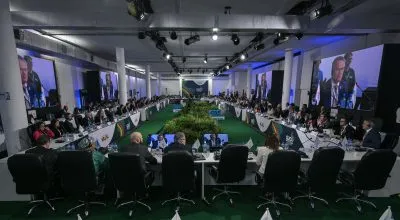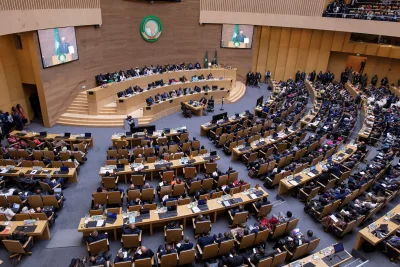NJ Ayuk’s new book explains how countries can avoid the resource curse and use their natural resources for the benefit of society. Review by Luca Tasciotti.
NJ Ayuk is a lawyer by training who has become a key player in the oil and gas sector across Africa specialising in frontier markets.
The book he has written is not just about African oil but rather the economic importance that oil and resources in general may have in a given economy, especially in terms of wide and meaningful impact.
The underlying message is that oil, and the flow of money deriving from it, does not have the power to bring benefits to our societies if not accompanied by policies and interactions among stakeholders.
It details out step-by-step guidelines countries should put in place to lay out the basis for a prosperous future. Although Ayuk focuses on the oil and gas sector, his principles apply to extractive industries more broadly.
The author stresses throughout the book the importance of symbiosis: international institutions should liaise with national governments, companies should listen to African leaders, educational systems should teach the importance and value of resources, and the labour market should integrate female workers. A concerto of efforts rather than a solo.
In an effort to understand the paradox brought about the resource curse, basically how can wealth bring about poverty, he delves deep into countries that have fallen into the resource trap but also sheds light on why and how others have overcome the curse.

The continent is replete with stories of resource mismanagement. Nigeria, despite its massive oil and gas reserves and a long history of production, still cannot refine the amount of petroleum products it consumes and is energy deficient. But the book tries to highlight the opportunity this presents and success stories on the continent, providing clear and lucid solutions to avoid succumbing to the inevitability of the resource curse.
The hope the author has is clear from the very beginning: the expectation is that success stories like Sempra Energy’s liquid natural gas facility in Louisiana, which is experiencing record growth and creating good-paying jobs in the US, should be able to occur in Angola, Algeria, Nigeria, Equatorial Guinea, Ghana, Gabon, and Cameroon.
It has happened in Chile with its endowment of copper and to a large extent in Botswana, the world’s leading producer of diamonds. Those experiences show that it is possible for countries rich in resources to profit and for its citizens to benefit as well. It just requires political commitment and well-thought-through policies and structures. The author rightly mentions that “ignoring the continent’s massive petroleum resources is not the key to avoiding the resource curse”. We need to embrace our wealth but do so intelligently.
Leveraging comparative advantage
This is Ayuk’s second book. In his previous book Big Barrels, he is highly critical of the aid model of the previous decades and once again in this book he is a proponent of private-sector-led development. And if a number of countries have suffered from a resource curse it shouldn’t be a reason to move away from it but rather to ensure that companies and governments deliver better outcomes. In any case, the continent has no choice. It needs to leverage its comparative advantage to drive growth and create the jobs needed for the millions of youth entering the jobs market.
Ayuk’s book is an easy read and practical in its approach. It is also wide-ranging, discussing how best to leverage institutions such as OPEC; the role of government and how to make it effective; greater stakeholder engagement on behalf of private sector; as well as the role of multi-lateral and supranational institutions. Primarily aimed at players in the oil and gas sector, the book is accessible and tries to bring a global perspective to issues. It is also rich in case studies, from the energy sector in Tanzania and the problem associated with the Tanesco monopoly to Trinidad and Tobago’s diversification policy and the synergies between Norwegian companies and Angola’s government.
Originally from Equatorial Guinea but now based in Johannesburg, South Africa, Ayuk advocates for African-led solutions and that ultimately success will have to be home-made. As Ayuk says: “Africans must unite in Africa, with Africans, for Africa.”
Want to continue reading? Subscribe today.
You've read all your free articles for this month! Subscribe now to enjoy full access to our content.
Digital Monthly
£8.00 / month
Receive full unlimited access to our articles, opinions, podcasts and more.
Digital Yearly
£70.00 / year
Our best value offer - save £26 and gain access to all of our digital content for an entire year!
 Sign in with Google
Sign in with Google 



